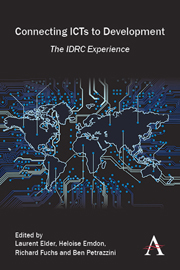Book contents
- Frontmatter
- Contents
- Acknowledgments
- Introduction Part I From Heresy to Orthodoxy: ICT4D at IDRC
- Introduction Part II From Beginning to End to Beginning Again
- Chapter 1 Catalyzing Access through Social and Technical Innovation
- Chapter 2 Catalyzing Access via Telecommunications Policy and Regulatory Research
- Chapter 3 Access to Knowledge as a New Paradigm for Research on ICTs and Intellectual Property
- Chapter 4 ICTs and Social Inclusion
- 5 Access and Usage of ICTs by the Poor (Part I)
- Chapter 6 Local Economic Opportunities and ICTs: How ICTs Affect Livelihoods (Part II)
- Chapter 7 Research on eHealth across Health Systems: Contributions to Strengthen a Field
- Chapter 8 Making the Grade: The Role of ICTs in Providing Access to Knowledge
- Chapter 9 E-Government for Development: ICTs in the Public Sector and the Evolving Citizen–Government Relationship
- Chapter 10 Innovations in Evaluating ICT4D Research
- Chapter 11 Conclusions: A Decade of Innovation that Matters
- Epilogue Into the Future: New Opportunities and Threats in a Global Networked Society
- Author Biographies
Chapter 8 - Making the Grade: The Role of ICTs in Providing Access to Knowledge
from Introduction Part II - From Beginning to End to Beginning Again
Published online by Cambridge University Press: 05 March 2014
- Frontmatter
- Contents
- Acknowledgments
- Introduction Part I From Heresy to Orthodoxy: ICT4D at IDRC
- Introduction Part II From Beginning to End to Beginning Again
- Chapter 1 Catalyzing Access through Social and Technical Innovation
- Chapter 2 Catalyzing Access via Telecommunications Policy and Regulatory Research
- Chapter 3 Access to Knowledge as a New Paradigm for Research on ICTs and Intellectual Property
- Chapter 4 ICTs and Social Inclusion
- 5 Access and Usage of ICTs by the Poor (Part I)
- Chapter 6 Local Economic Opportunities and ICTs: How ICTs Affect Livelihoods (Part II)
- Chapter 7 Research on eHealth across Health Systems: Contributions to Strengthen a Field
- Chapter 8 Making the Grade: The Role of ICTs in Providing Access to Knowledge
- Chapter 9 E-Government for Development: ICTs in the Public Sector and the Evolving Citizen–Government Relationship
- Chapter 10 Innovations in Evaluating ICT4D Research
- Chapter 11 Conclusions: A Decade of Innovation that Matters
- Epilogue Into the Future: New Opportunities and Threats in a Global Networked Society
- Author Biographies
Summary
Education plays an important role in development. Basic education is at the core of national strategies aimed at enhancing human development, social and political empowerment and economic progress. The recognition of the value of education is clearly reflected in the second goal of the UN Millennium Development Goals, which aims to achieve universal primary education for children everywhere, boys and girls alike, by 2015. Achieving these goals is particularly important in this age of the global knowledge economy, where many socioeconomic groups in developing countries risk exclusion from the economic and social benefits that this new knowledge economy can potentially provide (Castells 1996).
A long-standing relationship exists between education and technology; some would suggest it began with the invention of the printing press. As new technologies emerged, educational providers have tried to integrate them into the learning process. The emergence of newer information and communications technologies (ICTs), like computers and mobile phones, has significantly widened the scope of how technologies can facilitate educational processes and there is a growing interest in using ICTs in developing countries' educational settings. Many believe that introducing ICTs into these contexts will have great impact given the systematic problems of access to quality education in the developing world. Yet evidence is lacking with regard to the actual impact of ICTs on the educational sector. Trucano, in a 2005 World Bank/infoDev study, found that the impact of ICT use on learning outcomes is unclear and open to much debate as reportedly very little useful data exist on several dimensions of ICT interventions in education.
- Type
- Chapter
- Information
- Connecting ICTs to DevelopmentThe IDRC Experience, pp. 197 - 214Publisher: Anthem PressPrint publication year: 2013



